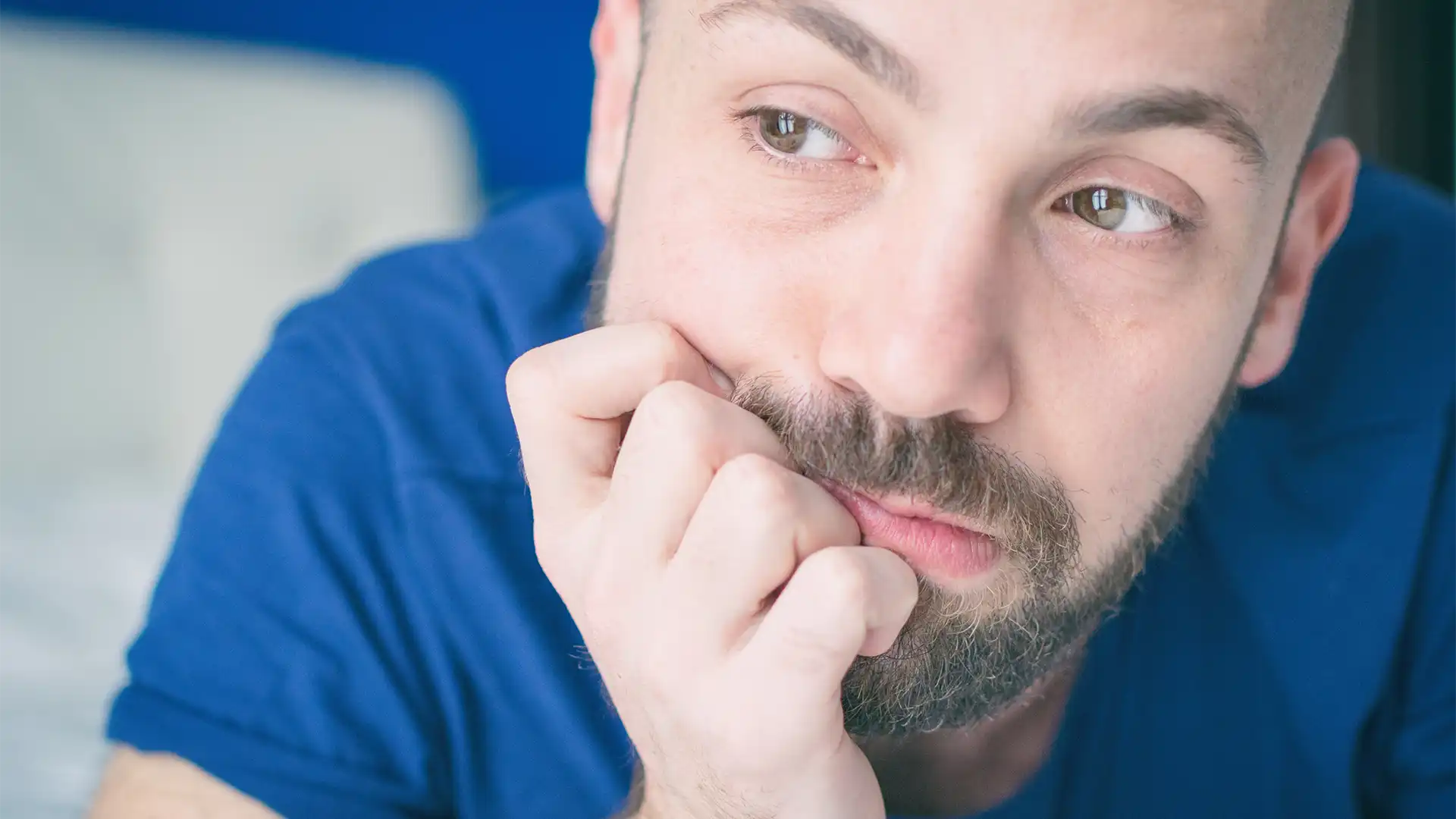What Is The Effect Of Anxiety On Mental And Physical Health?
Anxiety, a pervasive condition affecting millions globally, significantly impacts mental and physical health.
Recent studies show that prolonged exposure to stress and worry can lead to debilitating conditions such as depression, cardiovascular disease, and even metabolic syndrome.
How anxiety impacts our wellbeing.
It’s not just the mind at risk; the body also bears the brunt of anxiety’s adverse effects. Changes in appetite, sleep disturbances, and compromised immunity are some physical repercussions of chronic anxiety.
Moreover, there’s a growing concern about how modern technology, like social media and smartphones, exacerbates these issues by creating an environment ripe for constant stress and comparison.
In today’s world, where we are dealing with global crises like the COVID-19 pandemic, addressing mental health challenges becomes even more critical.
This article aims to highlight the complex relationship between anxiety disorders, panic attacks and overall health – a crucial step in fostering wellbeing in our stressful world.
Key Takeaways
- Anxiety significantly impacts mental and physical health, leading to depression, cardiovascular disease, and metabolic syndrome.
- Prolonged exposure to stress and worry can result in changes in appetite, sleep disturbances, compromised immunity, and physical symptoms like increased heart rate, shortness of breath, and digestive issues.
- Modern technology, including social media and smartphones, exacerbates anxiety, and excessive screen time can worsen anxiety and depression.
- Seeking support from mental health professionals is crucial for individuals with anxiety disorders, as ignoring symptoms can worsen mental health and well-being.
The Link Between Anxiety and Wellbeing
You might not realize it, but there’s a deep connection between your anxiety and your overall well-being. The effects of anxiety on the body can be detrimental, impacting both physical and mental health significantly.
Anxiety affects our thought processes, often leading to negative thinking patterns that harm our psychological state. It can cause us to excessively fixate on perceived threats or worries, undermining our emotional stability.
Moreover, anxiety’s impact isn’t limited to the mind; it also has physiological implications. It can lead to an increased heart rate, shortness of breath, and even digestive issues.
Understanding how anxiety can impact both facets of health is crucial in appreciating why managing this condition effectively for overall well-being is essential.
Importance of Seeking Support for Mental Health Challenges
When you’re grappling with overwhelming emotions, reaching out for help is essential – a little professional guidance can work wonders in restoring balance. For individuals with an anxiety disorder, seeking support from a mental health professional is crucial. Such professionals can provide strategies to manage mental health problems and limit the impact on your life.
Anxiety Disorder Symptoms Impact on Life Treatment Options 1 Chronic worry Sleep disruption Therapy 2 Restlessness Reduced focus Medication 3 Irritability Relationship strain Lifestyle changes
Ignoring symptoms may exacerbate the situation and compromise mental health and well-being. Seeking timely intervention can alleviate distress, enabling healthier, more balanced living amidst challenging times.
Positive and Negative Effects of Social Media and Smartphones on Mental Health
Navigating the digital world, it’s clear that social media and smartphones play a complex role in our daily moods and overall state of mind. On the one hand, these platforms can foster connections and provide access to resources for managing mental health disorders.
However, there is growing evidence that anxiety is impacting an increasing number of users due to constant connectivity. Research links excessive screen time with common mental health problems, including depression and anxiety. The pressure to present ‘perfect’ lives online can significantly worsen these issues, negatively affecting physical and mental health.
It’s vital to balance digital usage with real-life interactions to maintain well-being. Thus, while beneficial in certain aspects, unchecked use might aggravate existing conditions or even trigger new ones.
Anxiety Takes Away from Overall Health and Wellbeing
It’s undeniable that a constant state of worry can chip away at one’s overall sense of well-being and happiness. Anxiety takes away from general health and wellbeing, having physical and psychological symptoms.
It’s not just about feeling stressed; the effect of anxiety on mental and physical health is far-reaching, often causing extensive damage beyond what one might expect. Anxiety may interfere with daily activities, relationships, and even our ability to function normally. The body’s natural anxiety reactions are heightened, leading to symptoms like sleep disturbances, muscle tension, headaches or gastrointestinal issues.
On the mental side, it can cause a sense of dread or panic and affect concentration levels. Thus, managing anxiety effectively becomes critical for preserving mental and physical health.
The Impact of Logging Out of Social Media on Mood and Stress Levels
Disconnecting from social media can significantly boost your mood and lower stress levels, offering a respite from the relentless pace of online interactions and content consumption. This practice can help individuals manage anxiety and stress that often permeate daily lives, contributing to mental health conditions.
Social Media Use Disconnecting from Social Media
1. Can increase feelings of anxiety and reduce anxiety and stress
2. Promotes constant comparison with others, leading to low self-esteem. Encourages self-reflection and improved self-esteem
3. Exposing users to negative news may induce fear or worry. It provides a break from negativity, reducing the chances of feeling anxious
4. May disrupt sleep patterns due to excessive screen time. Improves sleep quality by limiting screen exposure
5. Increases risk for developing an addiction or dependency on platforms. Fosters healthier habits, potentially preventing further mental health conditions
Therefore, disconnecting presents an effective strategy against the adverse impacts of social media on our well-being.
The Physical Symptoms of Stress and Their Effects on Health
Experiencing chronic stress can manifest in your body, leading to many uncomfortable symptoms that can take a toll on your overall wellbeing. Notably, physical symptoms associated with stress directly impact health.
When the body is under constant strain, it produces excessive cortisol, which can disrupt normal bodily functions. Elevated cortisol levels lead to:
- Increased heart rate and blood pressure: This strains the cardiovascular system, potentially increasing the risk of heart disease.
- Digestive issues: Stress alters gut function and can lead to conditions like irritable bowel syndrome.
- Impaired cognitive function: Excessive cortisol restricts blood flow to your brain, affecting memory and concentration.
These effects on health highlight the importance of managing stress as part of maintaining optimal mental and physical health.
Building the Foundation for Emotional and Social Skills in Children
Developing emotional and social skills early in children’s lives is vital as it sets the groundwork for them to cope better with stress, thus indirectly contributing to their overall well-being.
When children understand anxiety, they’re better equipped to manage anxiety symptoms and reduce its physical effects. Evidence suggests that people with anxiety often struggle with social interactions due to intense worry or fear.
Children can learn how to navigate these feelings effectively by building strong emotional and social skills. Anxiety can cause significant disruptions in daily life; however, having the necessary tools to manage anxiety can help mitigate these impacts.
Therefore, fostering these skills from a young age is crucial for mental and physical health.
Decreasing Stress Levels Through Play
Through the simple joy of play, we can help our children lower their stress levels, fostering happiness and resilience in these uncertain times. Play is a natural way for children to express anxiety and work through it. Anxiety increases can trigger a physical response that manifests as symptoms of anxiety disorders.
Encouraging play provides an outlet for these responses, helping kids manage their feelings. Play helps decrease stress levels while promoting healthier physical and mental states.
Furthermore, navigating through imaginative scenarios during play aids in equipping children with coping mechanisms.
Thus, incorporating play into daily routines fosters the development of emotional and social skills while alleviating the impacts of heightened stress on children’s wellbeing.
Addressing Mental Health Challenges During a Global Crisis
Amid a global crisis, addressing challenges linked to our emotional well-being has become more critical than ever. Anxiety and depression are common mental health conditions that may be exacerbated during such times, impacting our physical and mental health detrimentally. Engaging in play may provide relief, but it’s also crucial to seek help from a health professional when needed.
Addressing mental health challenges during a global crisis involves creating safe spaces where people feel comfortable talking about their feelings without any fear of judgment or stigma. This approach supports individual healing and fosters collective resilience within communities, demonstrating the power of unity in overcoming adversity.
Coping with the post-Covid-19 Epidemic’s Impact on Mental Health
As we navigate the post-COVID-19 landscape, it’s okay to acknowledge the toll it may have taken on your emotional well-being. The long-term anxiety brought on by this global crisis has profoundly affected mental and physical health. Recognizing this impact is essential in coping with the post-Covid-19 epidemic’s impact on mental health.
Social Media Use Disconnecting from Social Media 1 It provides a break from negativity, reducing the chances of feeling anxious Reduces anxiety and stress 2 Promotes constant comparison with others, leading to low self-esteem Encourages self-reflection and improved self-esteem 3 Increases risk of developing an addiction or dependency on platforms Provides a break from negativity, reducing the chances of feeling anxious 4 May disrupt sleep patterns due to excessive screen time Improves sleep quality by limiting screen exposure 5 It provides a break from negativity, reducing the chances of feeling anxious Fosters healthier habits, potentially preventing further mental health conditions
Therefore, disconnecting presents an effective strategy against the adverse impacts of social media on our well-being.
The Physical Symptoms of Stress and Their Effects on Health
Experiencing chronic stress can manifest in your body, leading to a myriad of uncomfortable symptoms that can take a toll on your overall well-being. Notably, physical symptoms associated with stress directly impact health.
When the body is under constant strain, it produces an excessive amount of cortisol, which can disrupt normal bodily functions. Elevated cortisol levels lead to:
- Increased heart rate and blood pressure: This strains the cardiovascular system, potentially increasing the risk of heart disease.
- Digestive issues: Stress alters gut function and can lead to conditions like irritable bowel syndrome.
- Impaired cognitive function: Excessive cortisol restricts blood flow to your brain, affecting memory and concentration.
These effects on health highlight the importance of managing stress as part of maintaining optimal mental and physical health.
Building the Foundation for Emotional and Social Skills in Children
Developing emotional and social skills early in children’s lives is vital as it sets the groundwork for them to cope better with stress, thus indirectly contributing to their overall well-being.
When children understand what anxiety feels like, they’re better equipped to manage symptoms of anxiety and reduce its physical effects. Evidence suggests that people with anxiety often struggle with social interactions due to their intense worry or fear.
Children can learn how to navigate these feelings effectively by building strong emotional and social skills. Anxiety can cause significant disruptions in daily life; however, having the necessary tools to manage anxiety can help mitigate these impacts.
Therefore, fostering these skills from a young age is crucial for mental and physical health.
Decreasing Stress Levels Through Play
How anxiety impacts our well-being in children. Through the simple joy of play, we can help our children lower their stress levels, fostering happiness and resilience in these uncertain times. Play is a natural way for children to express feelings of anxiety and work through them. Anxiety increases can trigger a physical response that manifests as symptoms of anxiety disorders.
Encouraging play provides an outlet for these responses, helping kids manage their feelings. Play helps decrease stress levels while promoting healthier physical and mental states.
Furthermore, navigating through imaginative scenarios during play aids in equipping children with coping mechanisms.
Thus, incorporating play into daily routines fosters the development of emotional and social skills while alleviating the impacts of heightened stress on children’s well-being.
Addressing Mental Health Challenges During a Global Crisis
During a global crisis, addressing challenges linked to our emotional well-being has become more critical than ever. Anxiety and depression are common mental health issues that can be exacerbated during such times, impacting both our physical and mental health detrimentally. Engaging in play may provide relief, but it’s also crucial to seek help from a health professional.
Addressing mental health challenges during a global crisis involves creating safe spaces where people feel comfortable enough to talk about how they’re feeling without fear of judgment or stigma. This approach supports individual healing and fosters collective resilience within communities, demonstrating the power of unity in overcoming adversity.
Coping with the post-Covid-19 Epidemic’s Impact on Mental Health
As we navigate the post-COVID-19 landscape, it’s okay to acknowledge the toll it may have taken on your emotional well-being. The long-term anxiety brought on by this global crisis has had a profound effect on mental and physical health. Recognizing this impact is essential in coping with the post-Covid-19 epidemic’s impact on mental health.
Emotional Symptoms of Longterm Anxiety Physical Symptoms of Longterm Anxiety Restlessness, feeling wound-up or on edge Headaches, muscle tension Being easily fatigued Sleep problems Difficulty concentrating; mind going blank Rapid heart rate Irritability Shortness of breath
Understanding how anxiety disorders affect us can help guide our efforts towards improved well-being during these challenging times.
What is anxiety disorder?
Anxiety disorder is a type of disorder that involves excessive and persistent worry or fear about everyday situations. It affects how a person may think, feel, and behave.
What are the symptoms of anxiety?
Anxiety symptoms can vary but commonly include restlessness, irritability, difficulty focusing, concentrating muscle tension, and sleep disturbances.
How does anxiety affect physical health?
Anxiety can have physical symptoms such as increased heart rate, shortness of breath, dizziness, headaches, and stomachaches. It can also weaken the immune system and impact overall physical well-being.
Who is affected by anxiety?
People of all ages and backgrounds can experience anxiety. It is estimated that around 1 in every six individuals experience an anxiety disorder in their lifetime.
What are the different types of anxiety disorders?
Anxiety disorders may include generalised anxiety disorder, panic disorder, social anxiety disorder, and specific phobias. These disorders have different symptoms and triggers.
How does anxiety impact mental health?
Anxiety can contribute to developing mental health problems and disorders, such as depression. It can also impact existing mental health conditions.
How can anxiety be managed?
Anxiety can be managed through various strategies, including therapy, medication, self-help techniques, and lifestyle changes. Seeking support from a Clinical Hypnotherapist is recommended for proper management.
What are the effects of anxiety on the body?
Anxiety can have both physical and mental effects on the body. It can increase cortisol levels (the stress hormone), impacting various bodily functions and systems.
How does anxiety affect social interactions?
Anxiety, particularly social anxiety disorder, can make social interactions challenging. It can cause intense fear of judgment, embarrassment, or humiliation in social situations.
Can anxiety interfere with daily life?
Anxiety can interfere with daily life by affecting concentration, productivity, relationships, and overall quality of life. It can limit one’s ability to engage in everyday activities.
Conclusion
In conclusion, anxiety significantly impacts both mental and physical health. However, seeking support and building emotional resilience in children can counteract these effects. Additionally, reducing stress through play can also be beneficial. The use of social media also plays a role in our well-being, with disconnection potentially improving mood and stress levels.
Addressing these mental health challenges proactively is crucial, especially amid global crises like the Covid-19 pandemic.





















